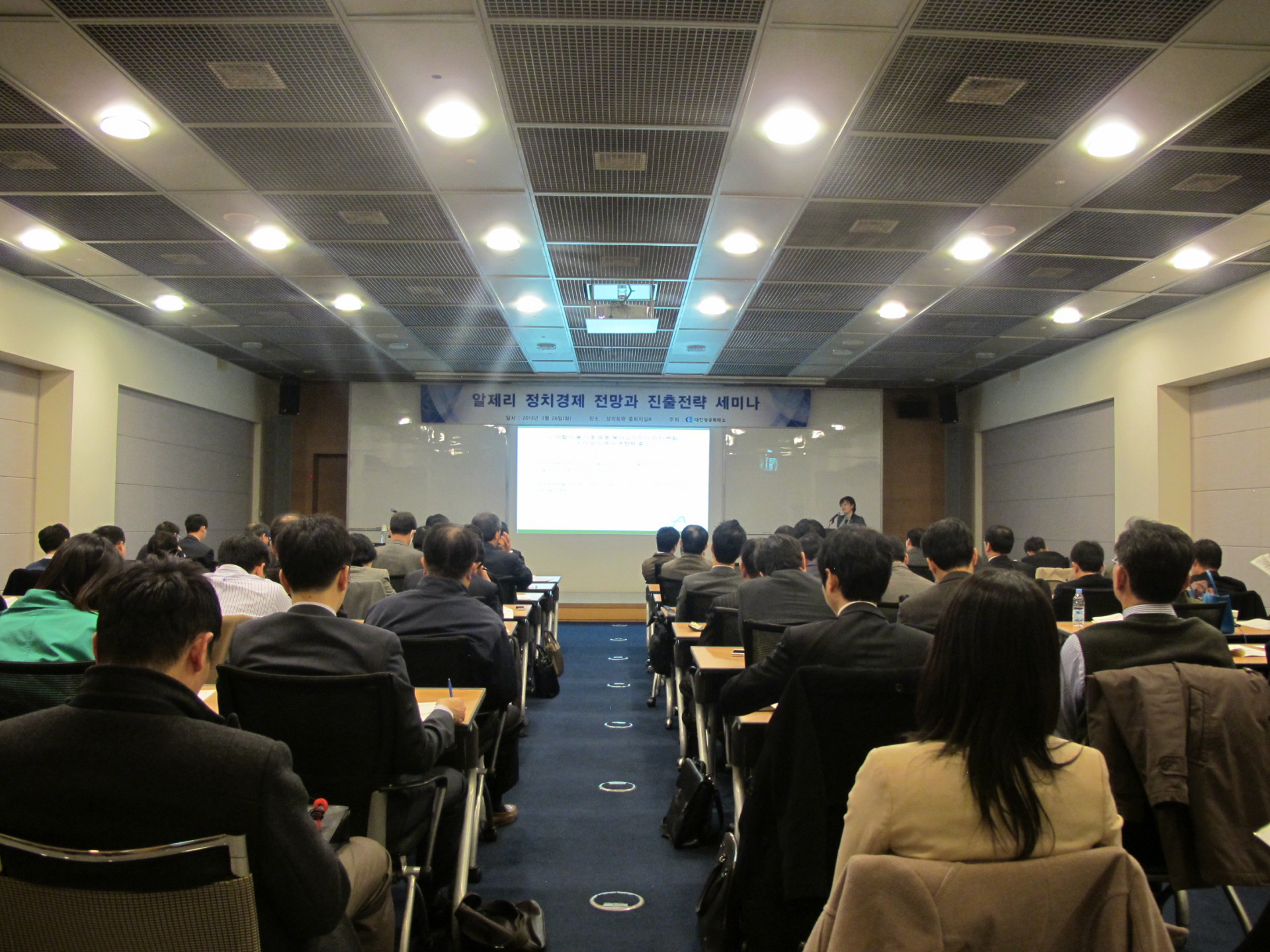영상
장지향, "아랍의 봄 이후 알제리와 북아프리카 정세"
- 작성자
- 장지향
- 조회
- 683
- 작성일
- 13-03-26 14:28
대한상공회의소: "알제리 정치경제 전망과 진출전략 세미나"
일시: 2013년 3월 26일(화)
장소: 상의회관 중회의실B

요약 (영문):
On Tuesday, March 26, 2013, Dr. Jang Ji-Hyang, Director of the Middle East and North Africa Center at the Asan Institute for Policy Studies, was a keynote speaker at a seminar hosted by the Korea Chamber of Commerce and Industry. Titled, “Views on Algeria’s Politics and Economy and Market Entry Strategies,” the seminar brought together more than 80 participants from Korea’s largest companies in the engineering, construction, energy sectors, and law firms. The goal of the seminar was to discuss some of the key developments in Algeria since January’s Amenas hostage crisis, which led to the deaths of 37 foreign workers, as well as the broader political and economic circumstances in North Africa since the political upheaval of the “Arab Spring” nearly two years ago.
In her presentation titled, “Algeria and North Africa after the Arab Spring,” Dr. Jang argued that several key domestic factors explained why Algeria was not part of the wave of uprisings in neighboring Tunisia, Egypt, and Libya. She noted that whereas the protests in other countries tended to coalesce around a nation-wide opposition movement, this was not the case in Algeria. Instead, since the 10 year long civil war between the military government and the Islamic Salvation Front (FIS) which resulted in 200,000 deaths, the government marginalized some Islamists who became radial Jihadists. At the same time, the government co-opted others into its system and pre-empted the establishment of a broad coalition that could harness widespread discontent. Consequently, despite estimates of more than 9,000 protests and riots across the country each year, localized unrest has not escalated into a national uprising mainly due to the absence of a viable movement and organization.
Dr. Jang went on to note that Algeria was like other “bunker” states such as Saddam Hussein’s Iraq, Muammar Qadhafi’s Libya, and Bashar Al-Assad’s Syria, in that rule by coercion and a weak private sector left little scope for negotiation or compromise. As new democracies in Iraq, Libya, and Egypt struggle with instability, Algeria’s authoritarian system may actually appear more stable. However, according to survey results by the Arab Barometer Survey, more than 75 percent of citizens express mistrust in the existing parties and civil organizations. This suggests that while they are not satisfied with the current state of politics, they just do not have a viable movement yet.

장지향
수석연구위원, 센터장
장지향 박사는 아산정책연구원의 수석연구위원이자 지역연구센터 센터장이다. 외교부 정책자문위원(2012-2018)을 지냈고 현재 산업부, 법무부, 국방부 자문위원으로 활동하고 있다. 한국외국어대학교에서 문학사, 정치학 석사 학위를, 미국 텍사스 오스틴 대학교(University of Texas at Austin)에서 정치학 박사 학위를 받았다. 주요연구 분야는 중동 정치경제, 정치 이슬람, 비교 민주주의와 독재, 극단주의 테러와 안보, 국제개발협력 등이다. 대표 저서로 중동정치를 비교분석한 «최소한의 중동 수업» (시공사 2023), 클레멘트 헨리(Clement Henry)와 공편한 The Arab Spring: Will It Lead to Democratic Transitions? (Palgrave Macmillan 2013), 논문으로 “팔레스타인 지도부의 정쟁과 이스라엘-팔레스타인 갈등의 전망” (아산이슈브리프 2022), 『중동 독재 정권의 말로와 북한의 미래』 (아산리포트 2018), “Disaggregated ISIS and the New Normal of Terrorism” (Asan Issue Brief 2016), “Islamic Fundamentalism” (International Encyclopedia of the Social Sciences 2008) 등이 있다. 옮긴 책으로는 파와즈 게르게스(Fawaz Gerges)의 «지하디스트의 여정» (아산정책연구원 2011)이 있다.
view more


